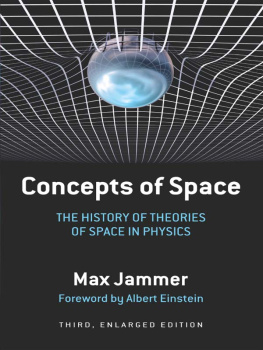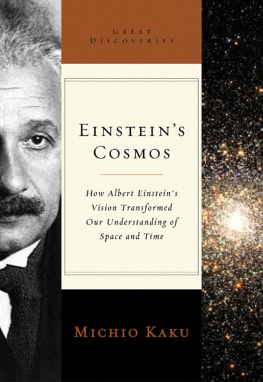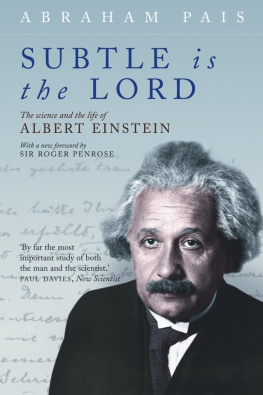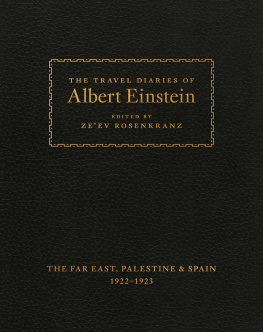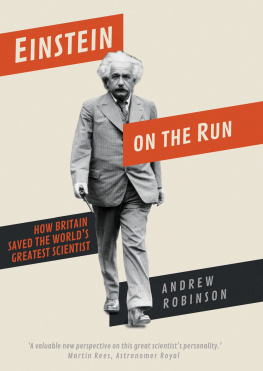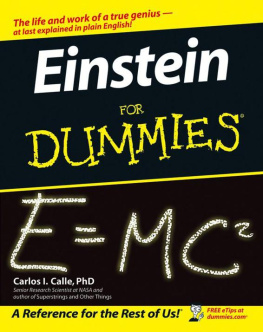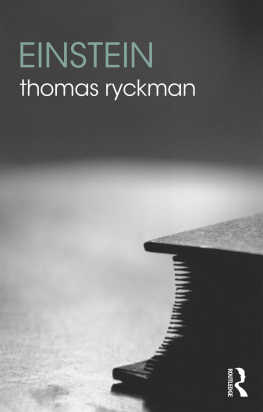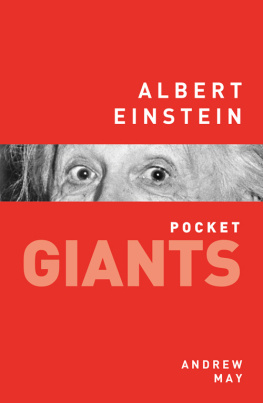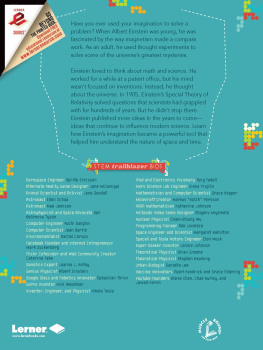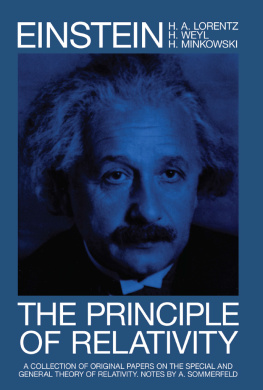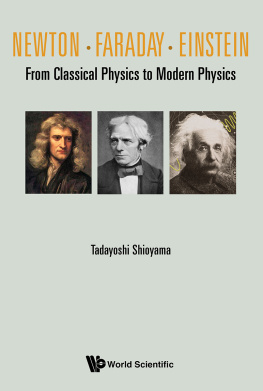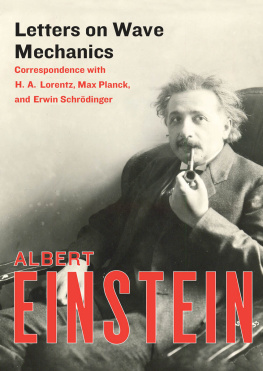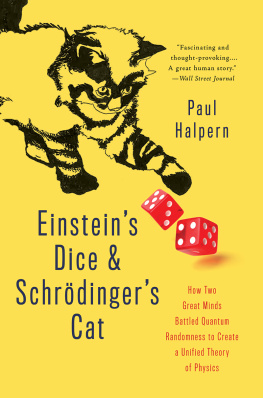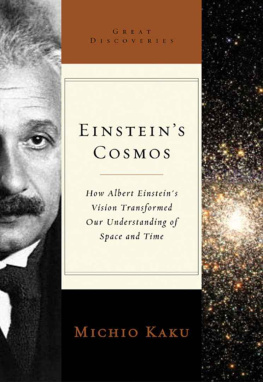Einstein Albert - Concepts of space: the history of theories of space in physics
Here you can read online Einstein Albert - Concepts of space: the history of theories of space in physics full text of the book (entire story) in english for free. Download pdf and epub, get meaning, cover and reviews about this ebook. City: New York, year: 2012;2013, publisher: Dover Publications, genre: Religion. Description of the work, (preface) as well as reviews are available. Best literature library LitArk.com created for fans of good reading and offers a wide selection of genres:
Romance novel
Science fiction
Adventure
Detective
Science
History
Home and family
Prose
Art
Politics
Computer
Non-fiction
Religion
Business
Children
Humor
Choose a favorite category and find really read worthwhile books. Enjoy immersion in the world of imagination, feel the emotions of the characters or learn something new for yourself, make an fascinating discovery.
- Book:Concepts of space: the history of theories of space in physics
- Author:
- Publisher:Dover Publications
- Genre:
- Year:2012;2013
- City:New York
- Rating:3 / 5
- Favourites:Add to favourites
- Your mark:
- 60
- 1
- 2
- 3
- 4
- 5
Concepts of space: the history of theories of space in physics: summary, description and annotation
We offer to read an annotation, description, summary or preface (depends on what the author of the book "Concepts of space: the history of theories of space in physics" wrote himself). If you haven't found the necessary information about the book — write in the comments, we will try to find it.
Concepts of space: the history of theories of space in physics — read online for free the complete book (whole text) full work
Below is the text of the book, divided by pages. System saving the place of the last page read, allows you to conveniently read the book "Concepts of space: the history of theories of space in physics" online for free, without having to search again every time where you left off. Put a bookmark, and you can go to the page where you finished reading at any time.
Font size:
Interval:
Bookmark:
CONCEPTS OF SPACE
T HE H ISTORY OF T HEORIES OF S PACE IN P HYSICS
CONCEPTS OF SPACE
T HE H ISTORY OF T HEORIES OF S PACE IN P HYSICS
MAX JAMMER
Foreword by Albert Einstein
THIRD, ENLARGED EDITION
DOVER PUBLICATIONS, INC.
Mineola, New York
Copyright
Copyright 1954 and 1969 by the President and Fellows of Harvard College.
Copyright renewed 1982 by Max Jammer.
Copyright 1993 by Max Jammer.
All rights reserved.
Bibliographical Note
This Dover edition, first published in 1993 and reissued in 2012,, is an unabridged, enlarged republication of the work originally published in 1954 (First Edition) and 1969 (Second Edition) by the Harvard University Press, Cambridge, Massachusetts. For this edition the author has written a new Preface and an entirely new chapter (Chapter 6) and has corrected a few errors in the text of the previous edition.
Library of Congress Cataloging-in-Publication Data
Jammer, Max.
Concepts of space : the history of theories of space in physics / Max Jammer ; foreword by Albert Einstein. 3rd enlarged ed.
p. cm.
Includes index.
1. Space and timeHistory. 2. PhysicsPhilosophy. 3. SciencePhilosophy. 4. Metaphysics. I. Title.
QC173.59.S65J36 1993
530.1dc20
93-8667
CIP
Manufactured in the United States by Courier Corporation
27119605
www.doverpublications.com
PREFACE TO THE DOVER EDITION
The first edition of Concepts of Space was published in 1954 by Harvard University Press. In 1969 the same publishers issued a second, revised and enlarged edition, the complete text of which is contained in the first five chapters of the present Dover edition. Translations of the book have appeared in German, Italian, Japanese, Spanish and Greek.
The additional chapter, of review articles which I had written for several publications such as, for example, La Philosophie contemporaine (Chroniques).
It lies in the very nature of the subject matter that the new chapter, dealing primarily with current philosophical and physical research, presupposes some knowledge of modern theoretical physics on the part of the reader. Nevertheless, to enable the nonprofessional reader to understand even the most recent developments, technical language and mathematical details have been avoided as much as possible without sacrificing the accuracy and logical rigor of the presentation. References to tensor analysis and differential geometry are made only when they are indispensable for the mathematical proof of the conclusions. But even in these cases the gist of the argument should be comprehensible to readers not conversant with these mathematical techniques.
Meticulously documented as it is, the book can also be used as a guide to the literature of the subject.
I am most grateful to all of my colleagues with whom I have discussed the recent developments in the philosophy of space and time and, in particular, to Professor John Earman for his kindness in reading the manuscript of and making useful comments. Finally, I wish to express my appreciation to Mr. Alan Weissman of Dover Publications for his careful editorial work.
Bar-Ilan University Ramat-Gan, Israel 1993 | M.J. |
PREFACE TO THE SECOND EDITION
The appearance of this new enlarged and revised edition of Concepts of Space gives me the opportunity to express my appreciation to all those who so very kindly offered constructive criticisms on the earlier issues of the book. I am particularly grateful to Professors Mario Bunge (McGill University, Montreal), Marcus Fierz (Swiss Federal Institute of Technology, Zrich), Joseph O. Hirschfelder (University of Wisconsin, Madison), Victor F. Lenzen (University of California, Berkeley), Edward Rosen (City College, New York), as well as to the late Alexandre Koyr (Paris), whose suggestions and comments proved most valuable. I also wish to express my indebtedness to Professor Adolf Grnbaum, President of the Philosophy of Science Association, for a prolonged correspondence and for his paper in The Philosophical Review pertaining to some issues raised in this book. Finally, it is my pleasure to thank the National Science Foundation for a Senior Scientist Fellowship which enabled me to complete the present revision of this book while enjoying the stimulating atmosphere of the Minnesota Center for the Philosophy of Science, directed by Professor Herbert Feigl.
M.J.
Bar-Ilan University, Ramat-Gan, Israel
Columbia University, New York
PREFACE TO THE FIRST EDITION
It is my firm conviction that the study of the history of scientific thought is most essential to a full understanding of the various aspects and achievements of modern culture. Such understanding is not to be reached by dealing with the problems of priority in the history of discoveries, the details of the chronology of inventions, or even the juxtaposition of all the histories of the particular sciences. It is the history of scientific thought in its broadest perspective against the cultural background of the period which has decisive importance for the modern mind.
The concept of space, in spite of its fundamental role in physics and philosophy, has never been treated from such a historical point of view. To meet this need an attempt has been made in the following pages to present the historical development of this concept and its corresponding theories.
Although the subject has attracted my attention for a long time, it was only recently, while lecturing at Harvard University, that I found at my disposal the necessary documentary material for the writing of this book. Since I was careful to confine myself to the treatment of space as a concept in physics, I had to omit many theories of space that are of special interest only to the professional philosopher. However, it would have violated my principle of broad perspective had I ignored any relevant metaphysical or even theological speculations on the subject.
A presentation of the historical development of a concept does not necessarily imply adherence to a strict chronological order of discussion. A topical treatment seems to be superior for the clear crystallization of the principal ideas involved, all the more so when, as in our case, it does not seriously violate the chronological order.
Most sources from which I have drawn my information are quoted extensively, some in their original language, but the majority in English. I have also supplied abundant bibliographical references so that the interested reader can readily check my contentions and pursue the study of particular points.
I am happy to acknowledge publicly my indebtedness to Professor Albert Einstein for the great interest he has manifested in this research and for his kind provision of the foreword. I had the privilege of discussing with him at the Institute for Advanced Study many important issues of the subject. I am also indebted to Professor George Sarton, to Professor I. Bernard Cohen, and to Professor H. A. Wolfson for their valuable suggestions and helpful criticism in the early stages of the work. Others to whom my sincere thanks must be accorded are the staffs of the Widener and Houghton Libraries at Harvard University and of the Butler Library at Columbia University. Further thanks are due to the United States Department of State, for its interest in my research, to Professor Alexander Dushkin, and to all my colleagues at the Hebrew University with whom I discussed various features of the subject. In conclusion the authors gratitude is expressed to the Harvard University Press and in particular to its Science Editor, Mr. Joseph D. Elder, for the encouragement received.
M.J.
Bar-Ilan University
Next pageFont size:
Interval:
Bookmark:
Similar books «Concepts of space: the history of theories of space in physics»
Look at similar books to Concepts of space: the history of theories of space in physics. We have selected literature similar in name and meaning in the hope of providing readers with more options to find new, interesting, not yet read works.
Discussion, reviews of the book Concepts of space: the history of theories of space in physics and just readers' own opinions. Leave your comments, write what you think about the work, its meaning or the main characters. Specify what exactly you liked and what you didn't like, and why you think so.

